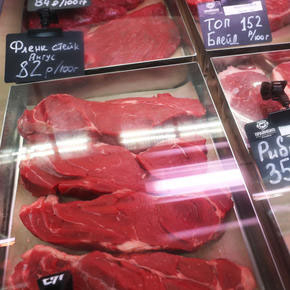Russia has introduced a mandatory electronic veterinary certification of products

 Producers in the Russian Federation are required from July 1, 2018, to issue veterinary certificates for animal products in electronic form in the Federal State Informational System (FGIS) Mercury. News Agency RIA Novosti interviewed producers and retailers that are not ready to work with the system, and some of them cast thoughts of appearance of the goods supply complexity in the local market.
Producers in the Russian Federation are required from July 1, 2018, to issue veterinary certificates for animal products in electronic form in the Federal State Informational System (FGIS) Mercury. News Agency RIA Novosti interviewed producers and retailers that are not ready to work with the system, and some of them cast thoughts of appearance of the goods supply complexity in the local market.
In mid-February of 2016, the Ministry of Justice registered the order of RF Ministry of Agriculture that claimed the list of the goods to be accompanied by veterinary documents. In late June, the RF Ministry of Agriculture published a draft of the order, slightly correcting the previous document but accepted it before July 1, 2018. In general, the list of products which should be accompanied by veterinary certificates remains unchanged. The documents will be issued for live animals, including cattle, pigs, sheep and poultry. IT-certification should also be provided for meat and meat offal, sausages, live, chilled and frozen fish, crustaceans and mollusks, fowl eggs and natural honey, and milk and cream, yogurt, kefir, butter, cheeses and cottage cheese deliveries. However, the goods produced from pasteurized (UHT, sterilized, ultra-high-temperature treated) milk or pasteurized dairy products, industrially manufactured and packed in consumer packaging have been delisted and are not put under Mercury system implementation.
According to the Russia VPSS, getting of electronic veterinary certificates on-stream will help to trace products from producers to retail stores. Service representatives expect 25 - 33 million electronic veterinary certificates issued per day this year. As of June 29, the achieved level of transition was approximately 12.5%.
Director of external relations of the Association of Retail Companies (ACORT unites the largest Russian retail chains) Roman Chernigovtsev told RIA Novosti that the companies, the Association members, are all ready to electronic veterinary certification (EVC). “At the same time from 20% to 30% of suppliers “have two strikes against”, he added. Vice President on Corporate Communication at Danone Russia & CIS Mrs. Marina Balabanova noted that the company welcomed the introduction of the EVC for raw material and has been working with milk suppliers through the system Mercury. According to Mrs. Balabanova, virtually 100% of the Danone’s contractors on raw materials are working in the system. “Readiness to work with the system is quite high, but there are risks of technical errors that may lead to Mercury system failures. It’s important to have use for the system debugging and for new conditions adjustment”, she said.
PepsiCo noted that most raw milk are well prepared for implementation of mandatory veterinary certification. In turn, Mr. Ilya Shestakov, the head of Russian Federal Fisheries Agency said last Friday that the Agency created a working group with representatives of the fishermen and Russia VPSS, which will track and solve the problems that arise in the process of transition to the EVC. “Problems will encounter certainly because the system is imperfect, it should be completed. The working group will gather weekly to figure out errors”, — Shestakov said.
Russian retail chains in general are also ready to use Mercury. “We are ready to run the system in test mode. Suppliers partly have not joined the Mercury yet. Together with them we take measures to accelerate their training”, — said the representative of X5 Retail Group (Russia’s largest retailer that is running retail chains “Pyaterochka”, “Perekrestok” and “Karusel”).
In the “Magnet” (the second largest Russian retailer by number of outlets) they recalled that the company started to use the system Mercury in the testing mode in 2017. “At the moment all commercial facilities of a retail chain were registered in Russia, the staff has been trained for work with the system Mercury”, — they noted in the company.
In turn, the Russian “Gazprom” has created its own integration of IT-application that allows information systems to transfer required data automatically and work with documents. “About 50% of our suppliers of vet supervised products are ready for working in FGIS Mercury, but only 30% of incoming e-veterinary accompanied documents are correct”, — said director for corporate communications at Auchan Retail Russia Mrs. Maria Kurnosova. Press-service of the Diksi retail chain reported complication of the development of essential business processes and 90% readiness to join the Mercury system. “Federal, regional or small suppliers are willing to work within the system”, the company said.
Metro Cash & Carry in Russia has also conducted compulsory training for its employees and has the technical possibility to pick up products and repay expenses on veterinary accompanied documents to products suppliers, placing them through the Mercury system. “The willingness of various suppliers in different categories. The average overall readiness of suppliers is 50% in average”, — said the press service of Metro. “Well ready chicken producers and processing meat producers while willingness of dairy industry is really weak”, — reported in the Metro. However, the chain sees no risk in milk and dairy products sourcing issues. The obligatory holding of IT-certification through the electronic system causes some concerns – this can lead to various failures in the system and even cause interruptions in the food supply.
SOURCE: NEWSMAKER